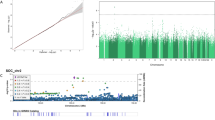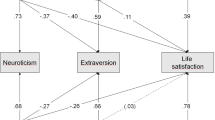Abstract
Background
The etiology of chronic fatigue syndrome (CFS) remains unknown. Personality traits influence well-being and may play a role in CFS and unexplained chronic fatigue.
Purpose
This study aimed to examine the association of emotional instability and extraversion with chronic fatigue and CFS in a genetically informative sample.
Methods
We evaluated 245 twin pairs for two definitions of chronic fatigue. They completed the Neuroticism and Extraversion subscales of the NEO Five Factor Inventory. Using a co-twin control design, we examined the association between personality and chronic fatigue.
Results
Higher emotional instability was associated with both definitions of chronic fatigue and was confounded by shared genetics. Lower extraversion was also associated with both definitions of fatigue, but was not confounded by familial factors.
Conclusions
Both emotional instability and extraversion are related to chronic fatigue and CFS. Whereas emotional instability and chronic fatigue are linked by shared genetic mechanisms, the relationship with extraversion may be causal and bidirectional.



Similar content being viewed by others
References
Fukuda K, Straus SE, Hickie I, et al. The chronic fatigue syndrome: A comprehensive approach to its definition and study. International Chronic Fatigue Syndrome Study Group. Ann Intern Med. 1994;121:953-959.
Wessely S, Hotopf M, Sharpe M. Chronic fatigue and its syndromes. Oxford: Oxford University Press; 1998.
Ranjith G. Epidemiology of chronic fatigue syndrome. Occup Med (Lond). 2005;55:13-19.
Steele L, Dobbins JG, Fukuda K, et al. The epidemiology of chronic fatigue in San Francisco. Am J Med. 1998;105:83S-90S.
van Geelen SM, Sinnema G, Hermans HJ, Kuis W. Personality and chronic fatigue syndrome: Methodological and conceptual issues. Clin Psychol Rev. 2007;27:885-903.
Kiecolt-Glaser JK, McGuire L, Robles TF, Glaser R. Psychoneuroimmunology and psychosomatic medicine: Back to the future. Psychosom Med. 2002;64:15-28.
Maier SF, Watkins LR. Cytokines for psychologists: Implications of bidirectional immune-to-brain communication for understanding behavior, mood, and cognition. Psychol Rev. 1998;105:83-107.
Segerstrom SC, Miller GE. Psychological stress and the human immune system: A meta-analytic study of 30 years of inquiry. Psychol Bull. 2004;130:601-630.
Wessely S. Old wine in new bottles: Neurasthenia and ‘ME’. Psychol Med. 1990;20:35-53.
Wessely S. Neurasthenia and chronic fatigue: Theory and practice in Britain and America. Transcult Psychiatry. 1994;31:173-209.
Greenberg DB. Neurasthenia in the 1980s: Chronic mononucleosis, chronic fatigue syndrome, and anxiety and depressive disorders. Psychosomatics. 1990;31:129-137.
Digman J. Personality structure: Emergence of the five-factor model. Annu Rev Psychol. 1990;41:417-440.
Costa P, McCrae R. Revised NEO Personality Inventory (NEO-PI-R) and NEO Five-Factor Inventory (NEO-FFI) professional manual. Odessa: Psychological Assessment Resources, Inc.; 1992.
Costa PT Jr, McCrae RR. Neuroticism, somatic complaints, and disease: Is the bark worse than the bite? J Pers. 1987;55:299-316.
Blakely AA, Howard RC, Sosich RM, et al. Psychiatric symptoms, personality and ways of coping in chronic fatigue syndrome. Psychol Med. 1991;21:347-362.
Buckley L, MacHale SM, Cavanagh JT, et al. Personality dimensions in chronic fatigue syndrome and depression. J Psychosom Res. 1999;46:395-400.
Christodoulou C, Deluca J, Johnson SK, et al. Examination of Cloninger’s basic dimensions of personality in fatiguing illness: Chronic fatigue syndrome and multiple sclerosis. J Psychosom Res. 1999;47:597-607.
Fiedler N, Lange G, Tiersky L, et al. Stressors, personality traits, and coping of Gulf War veterans with chronic fatigue. J Psychosom Res. 2000;48:525-535.
Johnson SK, DeLuca J, Natelson BH. Personality dimensions in the chronic fatigue syndrome: A comparison with multiple sclerosis and depression. J Psychiatr Res. 1996;30:9-20.
Kersh BC, Bradley LA, Alarcon GS, et al. Psychosocial and health status variables independently predict health care seeking in fibromyalgia. Arthritis Rheum. 2001;45:362-371.
Masuda A, Munemoto T, Yamanaka T, Takei M, Tei C. Psychosocial characteristics and immunological functions in patients with postinfectious chronic fatigue syndrome and noninfectious chronic fatigue syndrome. J Behav Med. 2002;25:477-485.
Kato K, Sullivan PF, Evengard B, Pedersen NL. Premorbid predictors of chronic fatigue. Arch Gen Psychiatry. 2006;63:1267-1272.
Charles ST, Gatz M, Kato K, Pedersen NL. Physical health 25 years later: The predictive ability of neuroticism. Health Psychol. 2008;27:369-378.
Courneya KSHL. Personality correlates of exercise behavior, motives, barriers and preferences: An application of the five-factor model. Pers Indiv Differ. 1998;24:625-633.
De Moor MH, Beem AL, Stubbe JH, Boomsma DI, De Geus EJ. Regular exercise, anxiety, depression and personality: A population-based study. Prev Med. 2006;42:273-279.
Rhodes RE, Courneya KS, Bobick TM. Personality and exercise participation across the breast cancer experience. Psychooncology. 2001;10:380-388.
Zautra AJ, Fasman R, Reich JW, et al. Fibromyalgia: Evidence for deficits in positive affect regulation. Psychosom Med. 2005;67:147-155.
Chubb HL, Jones I, Hillier J, et al. Chronic fatigue syndrome—Personality and attributional style of patients in comparison to healthy controls and depressed individuals. J Ment Health. 1999;8:351-359.
Diener E, Lucas R. Personality and subjective well-being. In: Kahneman D, Diener E, Schwarz N, eds. Well-being: The foundations of hedonic psychology. New York: Russell Sage; 1999:213-229.
Diener E, Suh EM, Lucas RE, Smith HL. Subjective well-being: Three decades of progress. Psychol Bull. 1999;125:276-302.
Diener E, Oishi S, Lucas RE. Personality, culture, and subjective well-being: Emotional and cognitive evaluations of life. Annu Rev Psychol. 2003;54:403-425.
Lucas RE, Fujita F. Factors influencing the relation between extraversion and pleasant affect. J Pers Soc Psychol. 2000;79:1039-1056.
Fleeson W, Malanos AB, Achille NM. An intraindividual process approach to the relationship between extraversion and positive affect: Is acting extraverted as “good” as being extraverted? J Pers Soc Psychol. 2002;83:1409-1422.
Bagby R, Joffe R, Parker J, Kalemba B, Harkness K. Major depression and the five-factor model of personality. J Personal Disord. 1995;9:224-234.
Bagby RM, Quilty LC, Segal ZV, et al. Personality and differential treatment response in major depression: A randomized controlled trial comparing cognitive-behavioural therapy and pharmacotherapy. Can J Psychiatry. 2008;53:361-370.
White PD, Goldsmith KA, Johnson AL, et al. Comparison of adaptive pacing therapy, cognitive behaviour therapy, graded exercise therapy, and specialist medical care for chronic fatigue syndrome (PACE): A randomised trial. Lancet. 2011;377:823-836.
McGue M, Osler M, Christensen K. Causal inference and observational research: The utility of twins. Perspect Psychol Sci. 2010;5:546-556.
Buchwald D, Herrell R, Ashton S, et al. The Chronic Fatigue Twin Registry: Method of construction, composition, and zygosity assignment. Twin Res. 1999;2:203-211.
Eisen S, Neuman R, Goldberg J, Rice J, True W. Determining zygosity in the Vietnam Era Twin Registry: An approach using questionnaires. Clin Genet. 1989;35:423-432.
Torgersen S. The determination of twin zygosity by means of a mailed questionnaire. Acta Genet Med Gemellol (Roma). 1979;28:225-236.
Bouchard TJ Jr, McGue M. Genetic and environmental influences on human psychological differences. J Neurobiol. 2003;54:4-45.
Kendler KS, Karkowski LM, Prescott CA. Causal relationship between stressful life events and the onset of major depression. Am J Psychiatry. 1999;156:837-841.
Friedman HS, Booth-Kewley S. The “disease-prone personality”. A meta-analytic view of the construct. Am Psychol. 1987;42:539-555.
Stanwyck DJ, Anson CA. Is personality related to illness? Cluster profiles of aggregated data. Advances. 1986;3:4-15.
Yousfi S, Matthews G, Amelang M, Schmidt-Rathjens C. Personality and disease: Correlations of multiple trait scores with various illnesses. J Health Psychol. 2004;9:627-647.
Lucas RE, Diener E, Grob A, Suh EM, Shao L. Cross-cultural evidence for the fundamental features of extraversion. J Pers Soc Psychol. 2000;79:452-468.
Cantor N, Norem J, Langston C, et al. Life tasks and daily life experience. J Pers. 1991;59:425-451.
Deale A, Chalder T, Marks I, Wessely S. Cognitive behavior therapy for chronic fatigue syndrome: A randomized controlled trial. Am J Psychiatry. 1997;154:408-414.
Fulcher KY, White PD. Randomised controlled trial of graded exercise in patients with the chronic fatigue syndrome. BMJ. 1997;314:1647-1652.
Moss-Morris R, Sharon C, Tobin R, Baldi JC. A randomized controlled graded exercise trial for chronic fatigue syndrome: Outcomes and mechanisms of change. J Health Psychol. 2005;10:245-259.
Prins JB, Bleijenberg G, Bazelmans E, et al. Cognitive behaviour therapy for chronic fatigue syndrome: A multicentre randomised controlled trial. Lancet. 2001;357:841-847.
Sharpe M, Hawton K, Simkin S, et al. Cognitive behaviour therapy for the chronic fatigue syndrome: A randomized controlled trial. BMJ. 1996;312:22-26.
Price JR, Mitchell E, Tidy E, Hunot V. Cognitive behaviour therapy for chronic fatigue syndrome in adults. Cochrane Database Syst Rev. 2008; (3):CD001027.
Edmonds M, McGuire H, Price J. Exercise therapy for chronic fatigue syndrome. Cochrane Database Syst Rev. 2004; (3):CD003200.
Acknowledgments
This research was supported by National Institutes of Health awards U19AI38429 (Buchwald) and R01AR51524 (Afari). Drs. Strachan, Buchwald, and Afari are supported in part by award RC2HL103416 (Buchwald). Dr. Strachan is supported in part by R21AI81347. Dr. Afari is also supported by the VA Center of Excellence for Stress and Mental Health.
Conflict of Interest
The authors have no conflict of interest to disclose.
Author information
Authors and Affiliations
Corresponding author
Additional information
Brian Poeschla and Eric Strachan contributed equally to this work.
About this article
Cite this article
Poeschla, B., Strachan, E., Dansie, E. et al. Chronic Fatigue and Personality: A Twin Study of Causal Pathways and Shared Liabilities. ann. behav. med. 45, 289–298 (2013). https://doi.org/10.1007/s12160-012-9463-5
Published:
Issue Date:
DOI: https://doi.org/10.1007/s12160-012-9463-5




